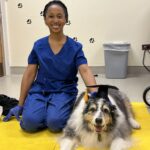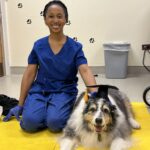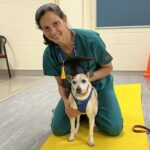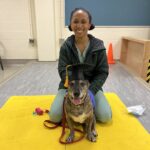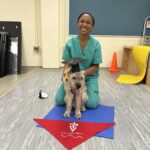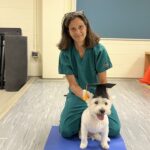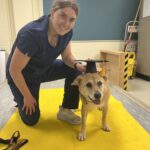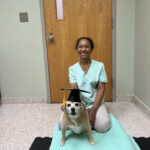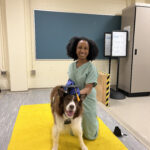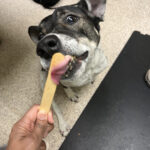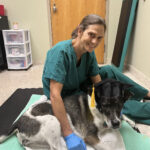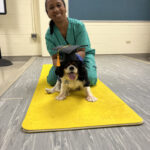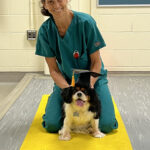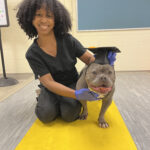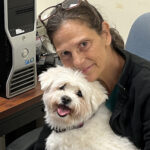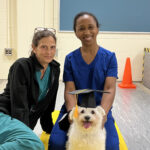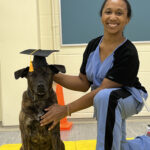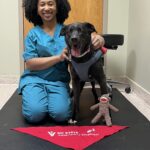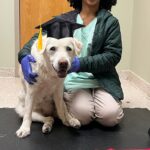Research Study for Senior Dogs: Targeting Frailty To Improve Healthspan and Well-Being
Description
Over the past decade, there has been an increased interest in assessing frailty in our aging companion animals. The goal of this study is to monitor how frailty in senior dogs progresses over time, and how activity impacts their well-being. We hope to use what we learn to better care for our aging four legged friends!
After the initial screening and meet and greet visit, dogs who are enrolled in the study will be monitored over a 6-month period. During this time frame, we will require 15 more visits to the NC State Veterinary Hospital. Three of these visits are study visits at Month 0, Month 3, and Month 6 in which our research team will collect information about your dog’s health, how they move and think through various exams, mobility and cognitive tests. The other 12 visits will be for rehabilitation therapy. All visits are drop off appointments for your convenience. Dogs will always receive lots of snuggles from our research team, as well as yummy (and diet appropriate!) treats.
We are comparing the progression of frailty in senior dogs who are receiving hospital rehabilitation therapy with dogs who are not receiving therapy over a 6-month period. If you choose to participate in this study, your dog may or may not be assigned to the treatment group that receives physical rehabilitation therapy.
Appointment Flow

Eligibility
Your dog may be a good candidate for this study if they are a senior dog (10 years or older!) experiencing two or more of the following conditions: decreased interest in playing, weight loss, muscle loss, difficulty walking, and/or get tired out more easily when exercising.
Dogs with stable chronic diseases which are not expected to impact the dog’s ability to complete the study may be accepted at the discretion of the researchers (for example, a dog with a heart murmur without evidence of progression towards heart failure).
If you suspect your dog is currently experiencing pain and/or you are unhappy with the pain management that your dog is currently receiving, please consult with your dog’s veterinarian to optimize their pain management prior to entering the study. The study is designed to see if rehabilitation therapy improves the health and well-being of frail dogs and therefore, we want to ensure your dog’s pain is well managed with medication, if you choose to do so, prior to the start of the study.
Dogs with cancer and dogs who are currently receiving rehabilitation therapy are not eligible for study participation.
Click here to take our eligibility survey!
Please note that we have a limited number of spaces in the rehabilitation service reserved for research patients. Therefore, we are enrolling patients for this study at different times throughout the year. It may take us some time to get back to you about bringing your dog in for a Meet & Greet appointment.
Congratulations to all of our Canine Frailty Study graduates!
Study Benefits
- FREE physical, orthopedic and neurological exam at each study visit
- FREE bloodwork and urine analysis (performed at the beginning and end of the study)
- BONUS: Dogs who are randomly assigned to the treatment group will receive free weekly rehabilitation therapy session for 12 weeks! When the study is completed, we will notify you what treatment your dog received.
Participation Includes:
Exams
Our study veterinarian will conduct a routine physical, orthopedic and neurological exam at the Meet & Greet appointment and all study visits. The results from these will be shared with you and your referring veterinarian.
Lab Work
We will obtain bloodwork and perform a urine analysis at the beginning and end of the study. The results form these will be shared with you and your referring veterinarian.
Mobility and Stability Assessments
These tasks involve walking your dog in different patterns, such as walking your dog in a figure eight or straight line. We’ll also ask your dog to stand on a pressure mat and go up and down stairs (if it is safe for them to do so!).
Muscle Strength
This task involves asking your dog to stand while we hold on of their back paws for ~ 15 seconds. This test may be performed on the ground or on an incline.
Cognitive Testing
We will ask your dog to look at a yummy treat that one of our researchers is holding and record how long they can do so! They, of course, will always get the yummy treat after the test is completed.
Muscle Mass
At Month 0 and Month 3 research study visits, the research team will give your dog a capsule containing creatine in a pill pocket (or some yummy cheese or peanut butter! Whatever your dog prefers!). The creatine will be stored in their muscles and excreted through their kidneys, allowing our research team to measure and approximate their muscle mass through back calculations they can perform based on how much creatine they measure in your dog’s urine sample. Following these research appointments, we will ask you to collect urine samples at home. Our research team will provide you with detailed instructions and a urine collection kit.
Activity Monitor
At your dog’s Meet & Greet visit, we will fit them with an activity monitor on their collar that will collect data to let us know the times of day that your dog is more active or more sedentary. Think of it as a puppy Fitbit!
Owner Questionnaires
We will ask you to complete questionnaires about your dog’s frailty status, quality of life, arthritis and joint pain, sleep habits, changes in behaviors, sleep patterns and general questions about their lifestyle. We will also ask you questions about your relationship with your dog.
Optional Sensitivity Tests
For this task, your dog will have a probe applied with increasing pressure to their back leg. As soon as your pup responds to the stimulus, the encounter is stopped and we move on to the next test. We are recording how much pressure your dog tolerates with cut-off’s in place (in case your dog tries to display a super-dog tolerance!). These procedures are performed in the same manner as they are in people.
Flyer
Meet the Research Team!
Dr. Natasha Olby, Study Supervisor (Co-Principal Investigator)
Dr. Margaret Gruen, Study Supervisor (Co-Principal Investigator)
Dr. David Knazovicky, Collaborator (Co-Investigator)
Dr. Telea Wade-LaHart, Lead Researcher and Study Veterinarian
Christine Whitley, Research Specialist
Dr. Carrie Britt, Sports Medicine and Rehabilitation Veterinarian
Tyler Payne, Sports Medicine and Rehabilitation Veterinary Technician
Dr. Rachel Caddiell, Study Coordinator and Collaborator
Dr. Masataka Enomoto, Collaborator
Beth Case, Research Assistant
Contact Us
For more information or any inquiries about participation, please contact our research team by email at k9neuroaging@ncsu.edu
- Categories:
